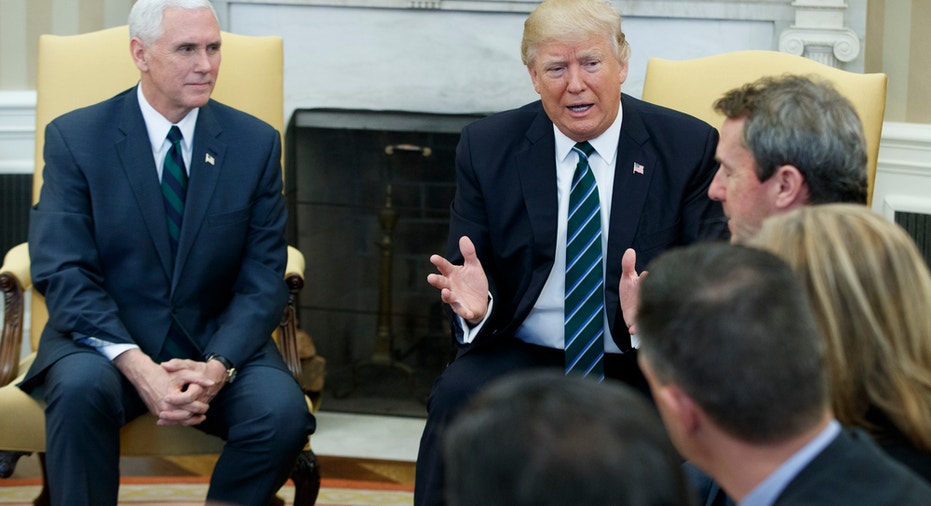Trump Ramps Up Fight for Votes on U.S. Health Care Overhaul

U.S. President Donald Trump on Friday stepped up his fight for support on Republicans' plan to dismantle Obamacare, wooing some conservative lawmakers at the White House ahead of an expected vote on the legislation in the House of Representatives next week.
Republicans remain deeply divided over their U.S. healthcare overhaul, Trump's first major legislative initiative and one that aims to fulfill his campaign pledge to repeal and replace the healthcare plan put in place by his Democratic predecessor, Barack Obama.
Republicans leaving a Capitol Hill meeting with House Speaker Paul Ryan and Health and Human Services Secretary Tom Price said the legislation is likely to be changed before it reaches the House floor in order to attract both moderate and conservative party members who are currently waffling about their support.
House Budget Committee Chairman Diane Black said it was very likely there would be such changes to adjust the tax credits offered in the bill to do more for older, lower-income people - something that Republican moderates have sought.
Republican Representative Kevin Cramer said he expected some more specific language regarding options for states implementing the Medicaid government insurance program for the poor, such as an optional work requirement for recipients. Work requirements for able-bodied, childless Medicaid recipients are something conservatives want.
Trump met at the White House on Friday with 13 members of the House Republican Study Committee, a large group of conservative lawmakers, and declared afterward that he had won them over to the plan, known formally as the American Health Care Act.
"I'm 100 percent behind this," Trump told reporters after the meeting. "We made certain changes but frankly very little."
A senior Republican aide, who spoke on condition of anonymity, said among the modifications the conservatives "won" at the meeting with Trump were the optional work requirement for Medicaid. The changes also include allowing states to receive federal funding for Medicaid in a block grant instead of getting it on a per capita basis as the bill currently proposes, the aide said.
NOT ALL CONVINCED
But members of the hard-line Freedom Caucus, who did not attend the meeting with Trump, remain opposed or doubtful about the legislation.
Representative Mark Meadows, the Freedom Caucus chairman, said the optional work requirement on Medicaid "doesn't move the ball more than a couple yards on a very long playing field."
Representative Justin Amash, another member of the Freedom Caucus, tweeted: "Absolutely not true that conservatives have flipped to yes on the health care bill. It doesn't repeal Obamacare. It remains a disaster."
Meadows said his group has spoken with Senate Republicans about potential changes and will propose an amendment on Monday.
House Majority Leader Kevin McCarthy said the bill was expected on the House floor next week. It passed through a key House panel on Thursday despite objections by some conservatives who consider it too similar to the 2010 Obamacare law.
Conservatives want a quicker end to Obamacare's expansion of Medicaid while others are concerned about insurance costs for consumers.
Even if the replacement plan gets through the House, it still faces a battle in the Senate, where numerous Republicans also have voiced skepticism.
Democrats have roundly rejected the Republicans proposal, saying it harms the poor, elderly and working families while offering tax cuts to rich Americans and companies.
Before meeting with House Republicans on Friday Price told reporters the proposal addressed several issues important to Trump, such as maintaining insurance coverage of patients with pre-existing medical conditions.
Without Democratic support, Republicans cannot afford to lose many votes from their ranks, even though they control both chambers of Congress.
The nonpartisan Congressional Budget Office said on Monday that 14 million Americans would lose medical insurance by next year under the Republican plan.
The CBO projected 52 million people would be uninsured by 2026 if the bill became law, compared with 28 million who would not have coverage that year if the law remained unchanged.
Obamacare expanded insurance to about 20 million Americans.
(By Susan Cornwell and David Morgan; Additional reporting by David Morgan; Writing by Susan Heavey; Editing by Bill Trott)



















